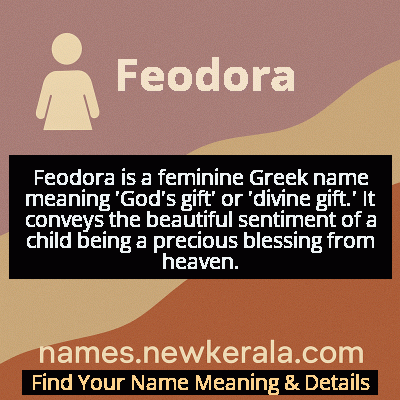Feodora Name Meaning & Details
Origin, Popularity, Numerology Analysis & Name Meaning of Feodora
Discover the origin, meaning, and cultural significance of the name FEODORA. Delve into its historical roots and explore the lasting impact it has had on communities and traditions.
Name
Feodora
Gender
Female
Origin
Greek
Lucky Number
1
Meaning of the Name - Feodora
Feodora is a feminine Greek name meaning 'God's gift' or 'divine gift.' It conveys the beautiful sentiment of a child being a precious blessing from heaven.
Feodora - Complete Numerology Analysis
Your Numerology Number
Based on Pythagorean Numerology System
Ruling Planet
Sun
Positive Nature
Leaders, ambitious, highly driven, self-reliant, innovative.
Negative Traits
Overly aggressive, domineering, impatient, selfish.
Lucky Colours
Red, orange, gold.
Lucky Days
Sunday.
Lucky Stones
Ruby, garnet.
Harmony Numbers
2, 3, 9.
Best Suited Professions
Entrepreneurs, managers, engineers.
What People Like About You
Courage, determination, leadership.
Famous People Named Feodora
Princess Feodora of Leiningen
Royalty
Half-sister to Queen Victoria and influential European royal figure
Feodora Gleichen
Artist/Sculptor
Renowned British sculptor and member of the Royal Society of British Sculptors
Feodora of Saxe-Meiningen
Royalty
Princess of Saxe-Meiningen and mother of Prince Adolf of Schaumburg-Lippe
Feodora zu Hohenlohe-Langenburg
Noble
German princess and descendant of Queen Victoria
Name Variations & International Equivalents
Click on blue names to explore their detailed meanings. Gray names with will be available soon.
Cultural & Historical Significance
The name carries aristocratic connotations due to its frequent use in royal families, including the House of Romanov and various German principalities, where it symbolized both religious devotion and noble lineage. Its Slavic variations became widespread in Eastern Orthodox countries, where names with religious meanings held significant cultural importance. The name's persistence across centuries reflects its enduring appeal as a bridge between classical antiquity, Christian tradition, and European aristocracy.
Extended Personality Analysis
Women named Feodora are often perceived as possessing a regal and dignified presence, combining strength with grace. They tend to be intelligent, thoughtful individuals with a natural leadership quality and strong moral compass. The name suggests someone who is both traditional and innovative—able to honor heritage while embracing progress. Feodoras are typically seen as resilient and determined, capable of overcoming challenges with poise and wisdom.
They often exhibit a nurturing quality, reflecting the 'divine gift' aspect of their name's meaning, and may be drawn to roles where they can guide or support others. Their personality often blends intellectual depth with emotional intelligence, making them effective communicators and trusted advisors. The historical weight of the name lends an air of sophistication and purpose, suggesting someone who carries themselves with confidence and understands their potential to make meaningful contributions to their community or field.
Modern Usage & Popularity
In contemporary times, Feodora remains a relatively rare but cherished name, particularly among families with Greek, Russian, or German heritage. It has seen a modest revival in recent years as parents seek unique yet classic names with historical depth. While not ranking in most countries' top name lists, it maintains a presence in aristocratic circles and among those appreciating its royal connections and religious significance. The name is increasingly popular in Eastern Europe and among diaspora communities seeking to preserve cultural traditions, with modern usage often shortening to 'Feo' or 'Dora' for everyday convenience while preserving the formal elegance of the full name.
Symbolic & Spiritual Meanings
Feodora symbolizes divine blessing, grace, and the concept of being a cherished gift. The name carries connotations of protection, wisdom, and spiritual guidance, reflecting its meaning as 'God's gift.' It represents the intersection of faith and nobility, suggesting someone destined for significance and purpose. Symbolically, Feodora embodies the idea of preciousness and value—both in the spiritual sense of being divinely bestowed and in the worldly sense of aristocratic heritage. The name also suggests resilience and enduring strength, much like the historical figures who bore it, representing the ability to maintain dignity and influence across generations and through changing circumstances while serving as a beacon of tradition and excellence.

